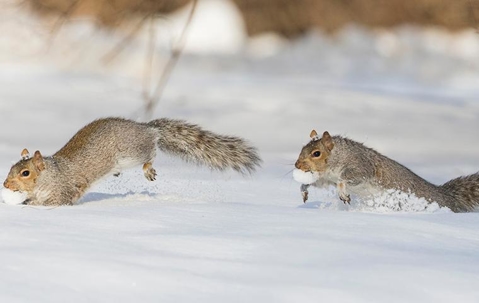Here in Salt Lake City, Utah, our winters aren’t pretty. Well, they are if you think snow is lovely, but if you’re a pest animal trying to keep warm enough to survive until spring, snow is anything but beautiful. And if you’re a homeowner trying to keep pest animals out of your house over the cold season, winter can get a lot less fun real fast. Everything from rodents to insects and maybe even wildlife might try to shack up with you until the frost melts. Your house has everything they need: food, warmth, liquid water, and shelter. While you cannot do anything to keep pests from wanting into your home, you can do a lot to keep them from actually getting in.
Common Overwintering Pests
Migrating animals pick up and shove off before the cold hits, but pest animals that stick around have to develop other strategies. Many animals hibernate through the coldest months, finding adequate shelter so they can slow their metabolisms and sleep away the winter. Other animals stay awake all winter – meaning they have to feed themselves even during the times of worst cold and deprivation.
Both hibernating and non-hibernating animals could try to set up shop in your home. Bats, raccoons, squirrels, and other wildlife may try to find their way into your attic to hunker down and wait out the cold months. Rats, mice, and many insects will remain more active. Things like rodents and roaches can indeed infest your home all year long, but in the winter, they’re incredibly motivated to get indoors.
Dangers Of Overwintering Pests
Pests that spend the winter in your home can do much damage. Many pest mammals breed in the fall or early winter so they can give birth in the spring. That means they’ll be working hard to make dens or nests before bedding down. Squirrels, rats, and raccoons may make holes in walls, rip up furniture or insulation for plush bedding material, and do other damage while they nest. Rats and mice will also damage things made of plastic, wood, and even metal while they’re chewing on them to grind down their teeth.
Property damage isn’t the only thing you have to worry about. Mammalian wildlife can also introduce secondary infestations of parasites like fleas or scabies into your home, not to mention all the deadly diseases that are spread by wildlife and insect pests. Rabies is especially a concern if you have bats, raccoons, or other larger mammals overwintering in your home. Your pets might be vaccinated, but unless you work with wild animals regularly, you and your family likely aren’t. If one of these pests sharing your home bites you, you could be on the hook for thousands of dollars worth of rabies vaccinations.
What To Do About Overwintering Pests
When winter comes, you’ll need to batten down the hatches to prevent pests. The most effective way to do that is to make it harder for them to access the things that attract them. To do this:
- Cap chimneys and install wire mesh over ventilation and condensation openings.
- Keep all indoor and outdoor trash securely covered.
- Seal all holes and cracks in your home’s exterior with silicone caulk.
- Keep pantry foods sealed in airtight containers, preferably made of hard plastic.
- Call the experts.
Here at Pest Pro Pest Control, we can inspect your home and help you develop an effective home pest control plan to prevent overwintering pests. We can also help you evict any unwanted four or six-legged houseguests that have already moved into your home. So give us a call or visit our contact page to schedule your appointment today.

